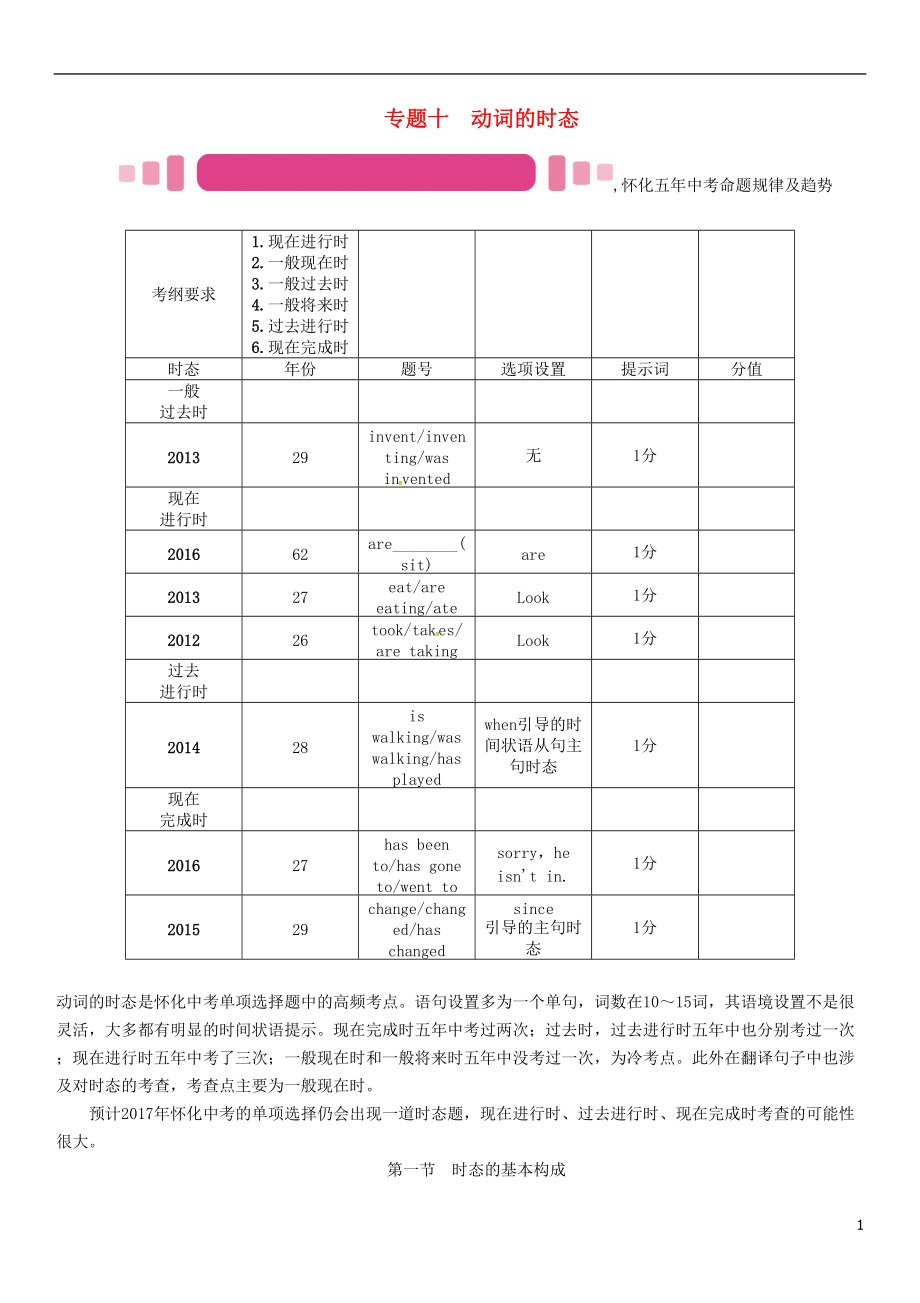《中考英語命題研究 第二編 語法專題突破篇 專題十 動詞的時態(tài) 第一節(jié) 時態(tài)的基本構(gòu)成精講試題1》由會員分享���,可在線閱讀�����,更多相關(guān)《中考英語命題研究 第二編 語法專題突破篇 專題十 動詞的時態(tài) 第一節(jié) 時態(tài)的基本構(gòu)成精講試題1(5頁珍藏版)》請?jiān)谘b配圖網(wǎng)上搜索����。
1����、專題十動詞的時態(tài),懷化五年中考命題規(guī)律及趨勢考綱要求1.現(xiàn)在進(jìn)行時2.一般現(xiàn)在時3.一般過去時4.一般將來時5.過去進(jìn)行時6.現(xiàn)在完成時時態(tài)年份題號選項(xiàng)設(shè)置提示詞分值一般過去時201329invent/inventing/was invented無1分現(xiàn)在進(jìn)行時201662are_(sit)are1分201327eat/are eating/ateLook1分201226took/takes/are takingLook1分過去進(jìn)行時201428is walking/was walking/has playedwhen引導(dǎo)的時間狀語從句主句時態(tài)1分現(xiàn)在完成時201627has been to/
2�����、has gone to/went tosorry,he isnt in.1分201529change/changed/has changedsince 引導(dǎo)的主句時態(tài)1分動詞的時態(tài)是懷化中考單項(xiàng)選擇題中的高頻考點(diǎn)����。語句設(shè)置多為一個單句,詞數(shù)在1015詞�����,其語境設(shè)置不是很靈活����,大多都有明顯的時間狀語提示。現(xiàn)在完成時五年中考過兩次���;過去時�����,過去進(jìn)行時五年中也分別考過一次����;現(xiàn)在進(jìn)行時五年中考了三次�;一般現(xiàn)在時和一般將來時五年中沒考過一次,為冷考點(diǎn)�。此外在翻譯句子中也涉及對時態(tài)的考查����,考查點(diǎn)主要為一般現(xiàn)在時�。預(yù)計(jì)2017年懷化中考的單項(xiàng)選擇仍會出現(xiàn)一道時態(tài)題,現(xiàn)在進(jìn)行時����、過去進(jìn)行時、現(xiàn)在完成時考查的可
3�����、能性很大����。第一節(jié)時態(tài)的基本構(gòu)成,懷化中考重難點(diǎn)突破【滿分點(diǎn)撥】1動詞的五種基本形式變化表英語動詞有五種基本形式,即動詞原形����、第三人稱單數(shù)(現(xiàn)在式)、過去式���、過去分詞和現(xiàn)在分詞�����。形式構(gòu)成例詞動詞原形沒有經(jīng)過任何變形�,就是詞典中一般給出的形式be�����,do���,have����,come第三人稱單數(shù)一般在動詞原形后直接加sworkworksreadreads以s�,o,x�,z,sh�����,ch結(jié)尾的動詞�,后加esgogoeswashwashes以輔音字母加y結(jié)尾的動詞,應(yīng)將y改為i再加esflyfliesstudystudies續(xù)表形式構(gòu)成例詞過去式與過去分詞一般在動詞原形后直接加edworkworkedstaystay
4���、ed在以e結(jié)尾的動詞后只加dcloseclosedlikeliked以輔音字母加y結(jié)尾的動詞���,應(yīng)將y改為i再加edstudystudiedcarrycarried以重讀閉音節(jié)結(jié)尾且末尾只有一個輔音字母的動詞���,雙寫此輔音字母再加edstopstoppedplanplanned續(xù)表形式構(gòu)成例詞現(xiàn)在分詞一般在動詞原形后直接加ingsleepsleepingwaitwaiting以不發(fā)音的e結(jié)尾的動詞,去e再加ingsmilesmilingmovemoving以重讀閉音節(jié)結(jié)尾且末尾只有一個輔音字母的動詞�����,雙寫此輔音字母再加ingsitsittingdigdiggingplanplanning少數(shù)以ie
5�����、結(jié)尾的動詞����,變ie為y,再加ingdiedyinglielying常見的短暫性動詞與延續(xù)性動詞的轉(zhuǎn)換:短暫性動詞延續(xù)性動詞have closed/openedhave been closed/openhave diedhave been deadhave lefthave been awayhave begun/startedhave been on續(xù)表短暫性動詞延續(xù)性動詞have finished/endedhave been overhave becomehave beenhave borrowedhave kepthave boughthave hadhave joinedhave be
6����、en a member of/have been inhave left sp.have been away from sp.have fallen asleephave been asleephave put onhave wornhave caught/got a coldhave had a coldhave got to knowhave known2常見6種時態(tài)的構(gòu)成及用法種類意義構(gòu)成特點(diǎn)時間標(biāo)志詞例句備注一般現(xiàn)在時1.現(xiàn)階段經(jīng)常性或習(xí)慣性動作2目前的狀態(tài)3客觀真理be用am/is/are;主語是第三人稱單數(shù)時���,作謂語的行為動詞詞尾加s/es���;其他人稱和數(shù)用動詞原形often�����,som
7、etimes����,usually,always����,twice a month,on Sundays����,every week/month/year(every系列)He usually leaves for school at 7 in the morning.他經(jīng)常早上7點(diǎn)去學(xué)校。The moon moves around the earth.月亮繞著地球轉(zhuǎn)���。一般過去時1.過去發(fā)生的動作2過去存在的狀態(tài)be用was/were���;其他動詞用過去式j(luò)ust now,ago�,in 1980,last night/week/month(last系列),this morning���,yesterday���,the oth
8、er day���,used toWe went to the History Museum last Monday.上周一我們?nèi)チ藲v史博物館�����。I was busy yesterday.我昨天很忙�。一般將來時1.將來發(fā)生的動作2將來存在的狀態(tài)1.助動詞will(shall)動詞原形2am/is/are going to動詞原形tomorrow�,from now on,soon���,in the future�����,next year/week/month/term(next系列)I will meet you at the school gate tomorrow.明天早上我將在校門口見你���。Ill be 15
9�����、 next week.下周我就15歲了�。在時間和條件狀語從句中�,用一般現(xiàn)在時代替一般將來時續(xù)表種類意義構(gòu)成特點(diǎn)時間標(biāo)志詞例句備注現(xiàn)在進(jìn)行時說話時或現(xiàn)階段正在進(jìn)行的動作am/is/are動詞的現(xiàn)在分詞now,at present����,at the moment�����,look����,listenThe telephone is ringing.Could you answer it,please�����?電話響了���,你可以接聽一下嗎���?表示位置移動或狀態(tài)變化的動詞�,如:come�����,go���,leave等詞的現(xiàn)在進(jìn)行時形式可表示將要發(fā)生的動作過去進(jìn)行時過去某一階段或某一時刻正在進(jìn)行的動作was/were動詞的現(xiàn)在分詞at 1:00
10����、 last night����,at that moment,表示過去時間的狀語從句I was reading when he came in.當(dāng)他進(jìn)來的時候�����,我正在讀書���。He was always complaining about something.他總是抱怨一些事情���。在復(fù)合句中����,如果兩個動作同時發(fā)生����,那么延續(xù)性動詞用過去進(jìn)行時,短暫性動詞用一般過去時�����,通常在when或while引導(dǎo)的時間狀語從句中出現(xiàn)現(xiàn)在完成時1.到現(xiàn)在為止已經(jīng)完成的動作����;對現(xiàn)在還有影響2從過去開始延續(xù)到現(xiàn)在的動作或狀態(tài)have/has動詞的過去分詞yet���,just���,before,recently���,once����,already,l
11�����、ately���,ever���,never,since 1996�,for ten yearsHe has only been to the Great Wall once.他去過長城一次。I have been in the Youth Volunteers for five years.我來到青年志愿者有五年了����。1.since后面的從句用一般過去時,主句用現(xiàn)在完成時2.短暫性動詞不與一段時間連用�����。如果要與一般時間連用必須換成延續(xù)性動詞(見上表)【考點(diǎn)搶測】一�����、詞語運(yùn)用1Grandma usually _wakes_up_ early in the morning.(醒來)2When we _compa
12�、re_(比較) Western culture with Chinese culture����,youll find many differences.3That company _provided_ (提供) us with 3���,000 dollars in 2012.4The thief stole_ (steal) food from the supermarket and was caught by the policemen.5The wind _swept_away_ (sweep away) the clouds and the sky was clear.6We still dont
13�、 know when your friend _will_come_ (come) here.7I overslept this morning.By the time I got to the train station�����,the train _had_left_(leave)8I _was_reading_ (read) a novel last night when I heard knocks at the door.二���、單項(xiàng)選擇( C )9.(2016張家界中考)_you ever_the history museum���,Paul?No,I havent.ADo���;visitBDid;vi
14�����、sitCHave����;visited( A )10.(2016泉州中考)Have you watched the new movie Kung Fu Panda 3�����,Kelly?Not yet.I_it with my classmate tonight.Awill watch Bwas watchingChave watched( B )11.(2016永州中考)What are you doing now?I_to the music.Ais listening Bam listeningCwas listening( A )12.(2016長沙中考)I think Ill take a bus to the meeting.The bus�����?If you_�����,youll be late.AdoBhave doneCwill do( C )13.(2016長沙中考)Your coat fits you well.Thank you.I_it when I was on vacation.Ahave boughtBbuyCbought( A )14.(2016常德中考)What were you doing when I phoned you yesterday evening?I_my homework.Awas doing Bhave done Cdid5
 中考英語命題研究 第二編 語法專題突破篇 專題十 動詞的時態(tài) 第一節(jié) 時態(tài)的基本構(gòu)成精講試題1
中考英語命題研究 第二編 語法專題突破篇 專題十 動詞的時態(tài) 第一節(jié) 時態(tài)的基本構(gòu)成精講試題1

